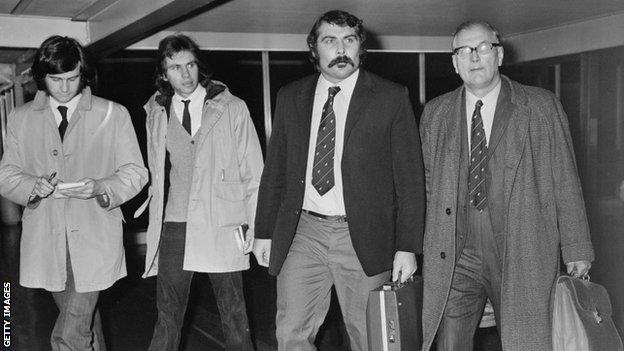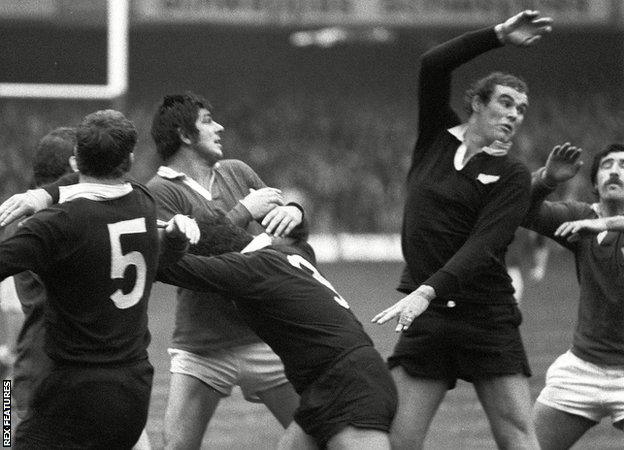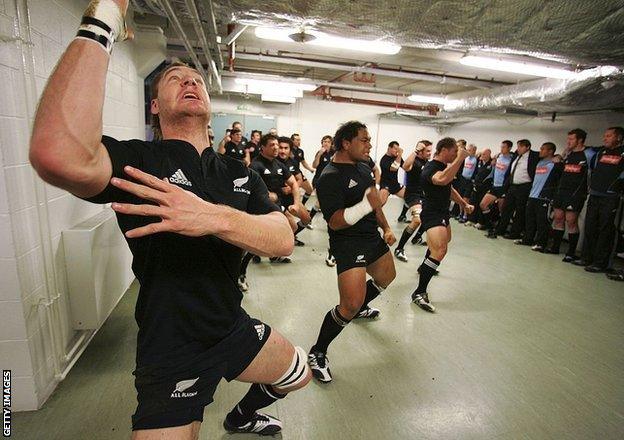Wales v New Zealand: Seven decades of Welsh agony against the All Blacks
- Published

Martyn Williams admitted the famous haka stand-off was a "surreal" moment
Cheating, national scandal, timekeeping disasters and spine-tingling drama... Wales against New Zealand rarely disappoints.
The history of matches between two nations that bleed rugby - and plenty of the red stuff has been spilt over the years - is almost a history of the game itself.
Since the 1905 'Match of the Century' which gave rise to the tradition of singing national anthems before sports events, they have battled.
Now Justin Tipuric's side are the latest to try to lift the millstone from around their neck and bring a 69-year losing run to an end.
There is bitterness that the wait has gone on so long, not least after the most talked about accusations of cheating in Welsh rugby history.
Cardiff in 1978 hosted what was as close to a World Cup final as the time allowed. The All Blacks had defeated the British & Irish Lions the previous year and Wales were Grand Slam champions.
It was the first time New Zealand had visited Cardiff since the infamous late-night incident in which Keith Murdoch was sent home in disgrace after punching a hotel doorman. Still today, All Blacks players, staff and fans stop at the Angel Hotel, opposite the Principality Stadium on Westgate Street, for a commemorative pint.

Keith Murdoch became a recluse in Australia up until his death in 2018
In 1978, Graham Mourie's tourists scored the game's only try but Wales had dominated, leading 12-10 as the clock inside the cauldron of the old Arms Park ticked towards the final minute.
Little did they know that New Zealand's players, braced for their biggest challenge of the tour, had hatched an escape plan the previous night.
Andy Haden, the All Blacks lock and culprit in chief, later wrote: "With Wales in front, I knew there could only be a minute or so left. I went to Frank Oliver, my locking partner... and told him the plan in four words: 'I'm going to dive'."
Sure enough, Haden catapulted out of the line-out just as Wales hooker Bobby Windsor threw the ball.
Wales' players stood bemused as referee Roger Quittenton of England gave a penalty and Brian McKechnie landed the winning points.
Quittenton would later claim he had penalised Geoff Wheel for an infringement, but the Kiwi intent was clear and the apparent injustice would rankle.

Andy Haden admitted in his autobiography that the All Blacks hatched a plan to cheat
Windsor described the game as the worst day of his career. He added: "I knew straight away that it was a con job. When we found out later that they had planned it the night before, that really got to me. I'll never forget that as long as I live."
It would be 26 years until Wales would come as close to ending the losing run.
In contrast to 1978, few expected much of a young Wales side in 2004 that had done little to impress despite scoring a record 37 points against the All Blacks in defeat at the World Cup in Australia the previous year.
Under new head coach Mike Ruddock and with a rising young star, Gavin Henson, in their ranks, Wales played with abandon and led at half-time, external through tries by Tom Shanklin and Mefin Davies.
New Zealand, jolted into action, had Joe Rokocoko, the most potent player on the planet at the time, to thank for two wonderful solo tries. But for once, Wales refused to yield and could have pulled off a shock if not for some disastrous timekeeping.
Wales, back to within a point after Henson's kick, thought there was injury time to come on the stadium clock, which in fact showed the correct time on the referee's watch.
With seconds to go, Stephen Jones kicked the ball away and Wales never had another chance.
Try-scorer Shanklin said: "It's actually more painful and frustrating now, when I look back, than it was at the time. We had been through some tough years so I was actually quite pleased that we hadn't been hammered and put on a great show.
"But looking back, you realise now just how close we came to making history. However, the pay-off was that autumn campaign set us up for another piece of history with the Grand Slam the following year."
Ken Owens wants to be part of Wales history
Just how to respond to the Haka has troubled opposition throughout the history of the game.
In 1905, the Welsh crowd's singing of Hen Wlad Fy Nhadau as a response to the Haka was the first time a national anthem was sung before an international sports event.
It had the desired effect. The New Zealand captain Dave Gallaher wrote later that he had never experienced anything like it in his life and they lost the only game in their 35-match tour.
However a century later, the Welsh Rugby Union's (WRU) attempted response to the Haka backfired disastrously.

The All Blacks were furious that the WRU insisted they break with tradition by performing the Haka before the home anthem
In 2005, the WRU asked to play the anthem after the Haka as part of the centenary celebrations of the fixture. New Zealand agreed - as a one-off.
So when the WRU asked to do the same again a year later, the All Blacks were not impressed. Both sides dug in their heels, and 74,000 expectant fans inside what was then the Millennium Stadium, as well as the Welsh players, looked on perplexed as a recording of the All Blacks performing the Haka in their dressing room was shown on the stadium's giant screens.
"Playing against them in 2006 will always stick with me," said former prop, external Adam Jones.
"For some reason the powers that be decided that it would be a good idea to try and convince the All Blacks to do their Haka before we responded with our national anthem.
"They put 40-odd points on us that day, and [then Harlequins team-mate] Nick Evans told me the incident ensured they wanted to destroy us."
Having learned from the experience, Wales two years later conjured up a spine-tingling response that remains etched in the mind of every spectator.
Wales v New Zealand: Staring down the haka in 2008
It was Warren Gatland's first game in charge of Wales against his native New Zealand and he challenged his senior players to understand the significance of the traditional Maori challenge. It was Martyn Williams who came up with a wonderfully simple but devilishly clever response.
"Gats explained that if you turn first, then psychologically the All Blacks have already got one up on you," said the former flanker.
"It was a bit of a throw-away comment, but I asked, 'well what if we just don't turn around?'. Let's line up on the 10-metre line, so we're not preventing the kick-off, and we'll just stand there."
What followed was 80 seconds of sporting theatre that was proof that rugby does not need pyrotechnics or piped music, just a stony-faced display of sheer determination.
Wales had positioned themselves perfectly, so it was the All Blacks, who had massed on the halfway line, who were forced to retreat.
"It felt like we were there forever and it just got louder and louder the longer we stood there," recalled Williams.
"It's one of those moments that everyone remembers. It was great theatre and, actually, the New Zealand boys said afterwards they loved it as well."
Did it work? Wales lost the game 29-9, external.
This weekend, another New Zealander is trying to bring that wait to an end. If Wayne Pivac's team do, it will doubtless require yet more sporting drama to a fixture already rich in history and infamy.

GAME CHANGERS: Go behind the scenes with Wales women's rugby team
RUCK STARS: Two of the biggest teams in rugby go head to head
